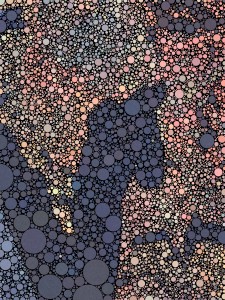
 Some deaths hit you
Some deaths hit you
like a broken bone.
That sharp. That painful.
They stick with you, hurting even when healing,
a dull throb keeping
you from sleeping;
a startled, knifeslash pang when jostled.
And you know that, decades later,
it’ll still be that ache, that pain,
that returns whenever you are standing,
alone, in the melancholy rain.
For Sarah Bird, 3/5/48-8/25/19, with all my love
...

Word-wrangling is art, no matter whether it is used for the lowest purposes or the most exalted, and the artist who relaxes and enjoys it learns to use artful techniques for the entertainment or edification of her/his readers. And they may, in that process, create something lasting.
At the same time, a dose of art in whatever form — visual, music, verbal — can shake things loose in our heads to the point where better and more interesting words fall out. This is why you should read books like Poetry as Insurgent Art.
Here’s Ferlinghetti himself on the notion of rejecting poetry, aka all that artsy stuff.
Don’t let them tell you poetry is bullshit.
Don’t let them tell you poetry is for the birds.
Have a good laugh at those who tell you poets are misfits or potential terrorists and a danger to the state.
Don’t let them tell you poetry is a neurosis that some people never outgrow.
Laugh at those who tell you poetry is all written by the Holy Ghost and you’re just a ghost-writer.
Don’t ever believe poetry is irrelevant in dark times.
If you’ve ever been inside Ciy Lights Bookstore in San Francisco, you’ve walked the same floorboards as Ferlinghetti, who co-founded the store with Peter Martin in 1953. He and Shig Murao, the manager, were arrested in 1956 on obscenity charges for selling copies of Allan Ginsberg’s Howl.
Why should you read this? I tell you what. I’ll let Ferlinghetti speak for himself by quoting the beginning of Poetry as Insurgent Art.
I am signaling you through the flames.
The North Pole is not where it used to be.
Manifest Destiny is no longer manifest.
Civilization self-destructs.
Nemesis is knocking at the door.
What are poets for, in such an age? What is the use of poetry?
The state of the world calls out for poetry to save it. (A voice in the wilderness!)
If you would be a poet, create works capable of answering the challenge of apocalyptic times, even if this means sounding apocalyptic.
You are Whitman, you are Poe, you are Mark Twain, you are Emily Dickinson and Edna St. Vincent Millay, you are Neruda and Mayakovsky and Pasolini, you are an American or a non-American, you can conquer the conquerers with words.
If you would be a poet, write living newspapers. Be a reporter from outer space, filing dispatches to some supreme managing editor who believes in full disclosure and has a low tolerance for bullshit.
Ferlinghetti should be read as a subversive act:
The idea of poetry as an arm of class war disturbs the sleep of those who do not wish to be disturbed in the pursuit of happiness.
The poet by definition is the bearer of Eros and love and freedom and thus the natural-born non-violent enemy of any police state.
Read this for the sake of poetry, “the last lighthouse in rising seas.”
...

I read Child of the Dark: The Diary of Carolina Maria de Jesus and Rubyfruit Jungle around the same time and in each case, the narrator stayed with me for years, was like a friend I’d met at summer camp or some other event, never seen again but well-remembered all the same.
Later I’d come to her poetry at a time when my ears were ready to drink it in. Her voice was sharp and observant, outspoken and nuanced all at once. Here’s one of my favorites among her poems, “I Rise.”
You may write me down in history
With your bitter, twisted lies,
You may tread me in the very dirt
But still, like dust, I’ll rise.Does my sassiness upset you?
Why are you beset with gloom?
‘Cause I walk like I’ve got oil wells
Pumping in my living room.Just like moons and like suns,
With the certainty of tides,
Just like hopes springing high,
Still I’ll rise.Did you want to see me broken?
Bowed head and lowered eyes?
Shoulders falling down like teardrops.
Weakened by my soulful cries.Does my haughtiness offend you?
Don’t you take it awful hard
‘Cause I laugh like I’ve got gold mines
Diggin’ in my own back yard.You may shoot me with your words,
You may cut me with your eyes,
You may kill me with your hatefulness,
But still, like air, I’ll rise.Does my sexiness upset you?
Does it come as a surprise
That I dance like I’ve got diamonds
At the meeting of my thighs?Out of the huts of history’s shame
I rise
Up from a past that’s rooted in pain
I rise
I’m a black ocean, leaping and wide,
Welling and swelling I bear in the tide.
Leaving behind nights of terror and fear
I rise
Into a daybreak that’s wondrously clear
I rise
Bringing the gifts that my ancestors gave,
I am the dream and the hope of the slave.
I rise
I rise
I rise.
Learning of her death this morning was a blow. She was bold and wonderful and eloquent, all that a poet should be. She spoke about our times and testified to her experience so others could learn from it. I have a special family in her heart, made up of the writers that have shaped me. Chaucer’s there, and Joanna Russ, and so many others. I wish I’d had the chance to meet her in person.
Here’s a recent quote from her I came across this morning and love: The ache for home lives in all of us, the safe place where we can go as we are and not be questioned.
I’m glad you’re home, Maya. But oh, those of us still aching for it will miss you.
...

What:Translation is an art form, and Coleman Barks’ translation does the poet justice. Rumi was a 13th century Persian mystic poet who may well be the most popular poet in America, given how often lines of his poetry show up on Pinterest.

Who: I cannot think of anyone who would not benefit from this book, particularly if you like poetry.
Why: Read this if you’re interested in simple language presenting wild and wonderful ecstasy. Read it if you’re wondering where you belong in the world or what you should be doing in it. Read it for lines that will linger with you.
When: Read this when you are first falling in or out of love. Read it when your soul is thirsty.
Where and how: Read this in intervals, taking time to savor each piece and turn it over in your head.
#sfwapro
...
Here the poets go again, riding down the trail of words into that long and lonesome valley, carrying ballpoint pens and notebooks in order to describe the shadows that lie across their lives. Lingering ashes are evidence of those who went before, who scared the lizards lurking on warm sandstone, whose mounts’ hoofbeats have already echoed along the rocks.
...
Want access to a lively community of writers and readers, free writing classes, co-working sessions, special speakers, weekly writing games, random pictures and MORE for as little as $2? Check out Cat’s Patreon campaign.

"(On the writing F&SF workshop) Wanted to crow and say thanks: the first story I wrote after taking your class was my very first sale. Coincidence? nah….thanks so much."

In this Medium article, Cat Rambo talks about concepts from musical opera to apply when writing space opera.


This site is protected by reCAPTCHA and the Google Privacy Policy and Terms of Service apply. This site is a participant in the Amazon Services LLC Associates Program, an affiliate advertising program designed to provide a means for sites to earn advertising fees by advertising and linking to Amazon.com.